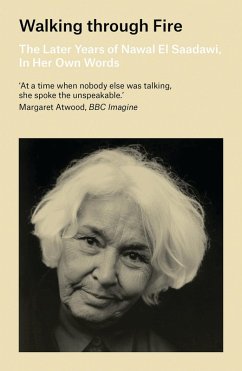'Words should not seek to please, to hide the wounds in our bodies, or the shameful moments in our lives. They may hurt, give us pain, but they can also provoke us to question what we have accepted for thousands of years.'
Nawal El Saadawi is one of the greatest writers to come out of the Arab world. Born in a small Egyptian village in 1931, her life and writings have shown an extraordinary strength of character and a unique ability to create new worlds in the fight against oppression. Saadawi has been pilloried, censored, imprisoned and exiled for her refusal to accept the oppression imposed on women by gender and class. Still, she continues to write.
In A Daughter of Isis, Nawal El Saadawi painted a beautifully textured portrait of the childhood that moulded her into a novelist and fearless campaigner for freedom and the rights of women. Walking through Fire takes up the story of her extraordinary life. We read about her as a rural doctor, trying to help a young girl escape from a terrible fate imposed on her by a brutal male tyranny. We learn about her activism for female empowerment and the authorities that try to obstruct her. We travel with her into exile after her name is put on a fundamentalist death list. We witness her three marriages, each offering in their way love, companionship and shared struggle. And we gain an unprecedented insight into this most wonderful of creative minds.
Nawal El Saadawi is one of the greatest writers to come out of the Arab world. Born in a small Egyptian village in 1931, her life and writings have shown an extraordinary strength of character and a unique ability to create new worlds in the fight against oppression. Saadawi has been pilloried, censored, imprisoned and exiled for her refusal to accept the oppression imposed on women by gender and class. Still, she continues to write.
In A Daughter of Isis, Nawal El Saadawi painted a beautifully textured portrait of the childhood that moulded her into a novelist and fearless campaigner for freedom and the rights of women. Walking through Fire takes up the story of her extraordinary life. We read about her as a rural doctor, trying to help a young girl escape from a terrible fate imposed on her by a brutal male tyranny. We learn about her activism for female empowerment and the authorities that try to obstruct her. We travel with her into exile after her name is put on a fundamentalist death list. We witness her three marriages, each offering in their way love, companionship and shared struggle. And we gain an unprecedented insight into this most wonderful of creative minds.
'Stormy and vivid, characterized by great intellectual and emotional restlessness ... It seems certain that without powerful self-belief and faith in her own instincts, she would not have survived.'
Times Literary Supplement
'I think her life has been one long death threat. At a time when nobody else was talking, she spoke the unspeakable.'
Margaret Atwood, BBC Imagine
'This is what great art does. It closes the great chasms between us. With words, Saadawi peels away the artifice to reveal the beating heart beneath the surface. We come away from this book as we do from all her others, amazed at her cool courage, profound insight, and deep passion. Without her brave work an entire country would not be fully known.'
Rebecca Walker
'A moving repudiation of those who have made Egypt's history in the last century'
Washington Post Book World
'El Saadawi's poetic prose and searing details keep the pages alive with stories of triumph, dissent, death and disappointment'
San Francisco Chronicle
'Her honesty, strength, courage, and accomplishments are admirable and inspiring'
Library Journal
Times Literary Supplement
'I think her life has been one long death threat. At a time when nobody else was talking, she spoke the unspeakable.'
Margaret Atwood, BBC Imagine
'This is what great art does. It closes the great chasms between us. With words, Saadawi peels away the artifice to reveal the beating heart beneath the surface. We come away from this book as we do from all her others, amazed at her cool courage, profound insight, and deep passion. Without her brave work an entire country would not be fully known.'
Rebecca Walker
'A moving repudiation of those who have made Egypt's history in the last century'
Washington Post Book World
'El Saadawi's poetic prose and searing details keep the pages alive with stories of triumph, dissent, death and disappointment'
San Francisco Chronicle
'Her honesty, strength, courage, and accomplishments are admirable and inspiring'
Library Journal





